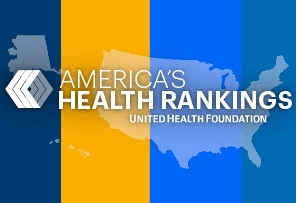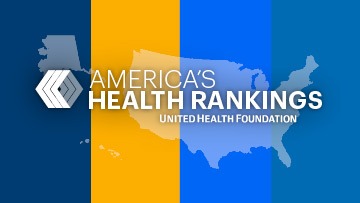United Health Foundation Releases America’s Health Rankings 2020 Annual Report


[SOUTH FLORIDA] – This year’s America’s Health Rankings® Annual Report showcases meaningful progress on key health markers. They include pre-pandemic improvements in the prevalence of multiple chronic conditions, rates of Americans receiving recommended vaccinations and the supply of mental health care providers.
The report also identifies challenges, such as the growing number of Americans facing obesity and frequent mental distress. This year’s report includes data that predates the onset of the COVID-19 pandemic and does not assign overall state rankings.
For 31 years, America’s Health Rankings has created increased awareness and action to address important trends in public health.
Today, the United Health Foundation released the America’s Health Rankings 2020 Annual Report, which provides one of the most comprehensive assessments of the nation’s health on a state-by-state basis.
The report was developed in partnership with the American Public Health Association.
Here in Florida, the 2020 Annual Report finds:
• Mental distress rose 21% between 2016 and 2019 from 11.4% to 13.8% of adults
• Chlamydia cases rose 58% between 2007 and 2018 from 315.5 to 499.2 cases per 100,000 population
• Suicide rose 10% between 2016 and 2018 from 14.6 to 16.0 deaths per 100,000 population
• Mental health providers rose 21% between 2016 and 2020 from 144.8 to 174.7 per 100,000 population
• Smoking decreased 23% between 2011 and 2019 from 19.3% to 14.8% of adults
• High school graduation racial gap decreased 18% between 2017 and 2018 from 11.4 to 9.3 percentage points
National key findings include:
- The percentage of American adults with multiple chronic conditions, defined as having three or more chronic health conditions, has declined from 10.3% in 2018 to 9.5% in 2019, driven largely by improvements in the prevalence of cardiovascular disease that has decreased from 9.0% to 8.4% between 2018 and 2019.
- Obesity increased 15% nationally from 27.8% to 31.9% of adults between 2011 and 2019, affecting nearly 70.4 million adults. This is a new high for a measure that has long been a challenge for Americans. Obesity has increased among all subpopulation groups during this same time period, including gender, age, education, income, race and ethnicity.
- The number of American adults who received the recommended flu vaccination increased 25% nationally from 35.0% to 43.7% during 2018 and 2019. Although vaccination rates remained far below the 70% targets for Healthy People 2030 recommended by the U.S. Department of Health and Human Services, these figures demonstrate progress among Americans receiving vaccinations that can prevent infectious diseases.
- The prevalence of adults who reported their mental health was not good for 14 or more days in the past 30 days increased 11% nationally, from 12.4% to 13.8% during 2018 and 2019. This is an increase of nearly 1.3 million adults experiencing frequent mental health distress. The suicide rate has also increased 23% nationally between 2009 and 2018. However, the nationwide growth in the supply of mental health providers is encouraging, with a 9% increase between 2019 and 2020.
“The issues we are seeing in this year’s report will be compounded further by the current COVID-19 pandemic. For years to follow, we expect that COVID-19 will impact almost every health and socioeconomic measure included in this report,” said Dr. Rhonda Randall, chief medical officer of UnitedHealthcare Employer & Individual and advisor to America’s Health Rankings.
“Having year-over-year trends is critical during a public health crisis, something that a record number of users are finding given the significant increased traffic to the America’s Health Rankings website. Making this data available is incredibly important so that a comprehensive view of our nation’s health can be taken into context during the COVID-19 pandemic.”
In recognition of the current-day public health challenges amid a pandemic, America’s Health Rankings has identified the measures from across the platform that the Centers for Disease Control and Prevention has identified as COVID-19 risk factors for severe COVID-19 illness.
As the country continues to face significant and unprecedented health challenges due to the pandemic, America’s Health Rankings will not include a state’s overall ranking in this year’s Annual Report.
The report will continue to equip health leaders with data and insights that inform priorities as they manage public health work during 2021 and beyond.
“The America’s Health Rankings 2020 Annual Report paints a picture of the nation’s ongoing public health successes and challenges as well as a deeper understanding of the nation’s health at the outset of the global COVID-19 pandemic,” said Georges C. Benjamin, MD, executive director of the American Public Health Association. “We hope this report inspires proactive solutions about effective ways to improve the health of everyone within our communities as we navigate the evolving pandemic and head into the next decade.”
Learn More
Visit the America’s Health Rankings website to explore the Annual Report data using customizable visualization tools. Or view the Executive Highlights — a summary that distills key findings from this year’s report.
- Nearly 10% of American adults have multiple chronic conditions, which may make them immunocompromised.
- Obesity: Increased 15% among American adults between 2011 and 2019.
- Flu vaccination rate: Increased 25% among American adults between 2018 and 2019.
- Frequent mental distress: Increased 11% among American adults between 2018 and 2019.
- Suicide rate: Increased 23% between 2009 and 2018.





